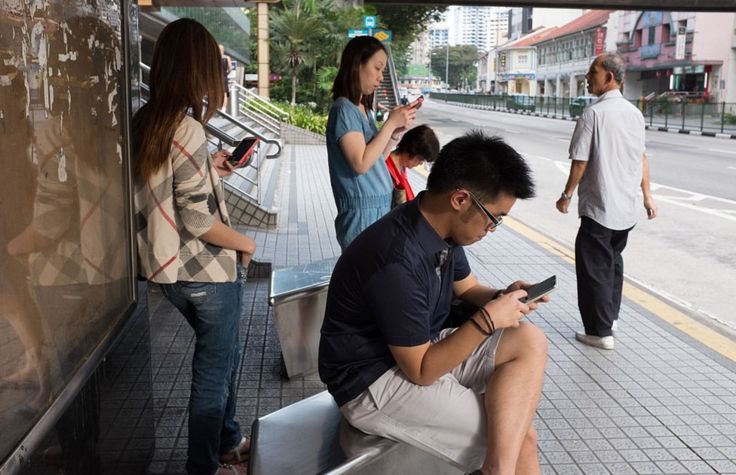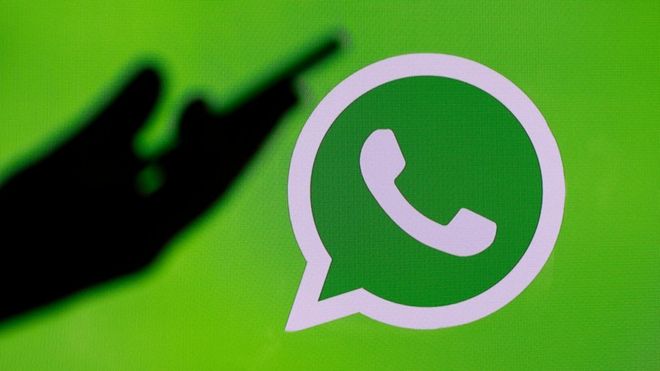Singapore fake news law polices chats and online platforms
By Tessa Wong BBC News, Singapore
Image copyright Neo Chee Wei/Getty ImagesThe law forbids false statements from being transmitted to users in Singapore
Singapore has passed a controversial anti-fake news law that gives authorities sweeping powers to police online platforms and even private chat groups.
The government can now order platforms to remove what it deems to be false statements that are "against the public interest", and to post corrections.
Authorities say the bill protects citizens from fake news.
But critics say it poses a serious threat to civil liberties.
It is also unclear how it could be enforced in some instances, such as policing content in encrypted apps.
The Protection from Online Falsehoods and Manipulation bill was passed by lawmakers on Wednesday and will come into force in the next few weeks.
The government has emphasised that the law would not be used to target opinions, but only falsehoods that could prove damaging.
"Free speech should not be affected by this bill," Law Minister K Shanmugam told parliament, adding that the law is aimed at tackling "falsehoods, bots, trolls, and fake accounts".
What does the law cover?
It bans the spread of what the government decides are false statements against the public interest. A person found guilty of doing this in Singapore could be fined heavily and/or jailed for up to five years.
It also bans the use of fake accounts or bots to spread fake news - this carries penalties of up to S$1m (£563,000, $733,700) and a jail term of up to 10 years.
The law can be applied across a broad range of platforms, from social media to news websites, which also face penalties if they do not comply with orders to take down content or post corrections.
Could the bill police private chats?
Perhaps one of the most controversial aspects is that it could be applied to closed private platforms such as chat groups and social media groups, including apps with end-to-end encryption, where only recipients and senders can see messages.
This would mean apps like WhatsApp, which is extremely popular in Singapore, and Telegram would be affected.
On Tuesday, a minister said in parliament that the private nature of such apps meant they were "ideal platforms" for the spread of falsehoods as they could be hidden from public view, and noted that they could reach "hundreds or thousands of strangers at a time".
"Closed platforms, chat groups, social media groups, can serve as a public megaphone as much as an open platform," said Senior Minister of State for Law Edwin Tong.
Image copyright Chesnot/Getty ImagesWhatsApp is one of the most popular messaging apps in Singapore
The bill states that false statements cannot be transmitted to users in Singapore through the internet, or through systems "that enable the transmission through a mobile network" of text and multimedia messages.
Authorities have not said how exactly they would gain access to private discussions on encrypted apps to police them.
Encrypted app companies have resisted such efforts in other countries. Earlier this year, WhatsApp
said an Indian government proposal for tech companies to hand over encrypted messages was "not possible".
But Mr Tong said Singapore could issue a "general correction order" to any platform, even one that is not carrying the falsehood in question. This could mean such platforms could be ordered to push out a mass correction note to users.
The BBC has asked Singapore's Law Ministry how the law would be enforced and whether it would encompass all chats, including those between individuals.
Phil Robertson, deputy director of Human Rights Watch's Asia division, called the idea of the Singapore government policing private chats "frankly insane".
"This is really moving towards a Big Brother style of control and censorship project," he told the BBC. "It's a direct threat to freedom of expression and is something the entire world should be alarmed about."
A WhatsApp spokesman told the BBC: "Societies have generally recognised the differences between private and more public forms of communication, and we look forward to doing our part to reduce the spread of misinformation while maintaining the private nature of our service."
The app, one of the world's most popular messaging platforms, has been increasingly used to spread fake news and
it recently introduced restrictions on message-sharing.
What has the reaction to the bill been?
The fake news law has attracted mounting criticism since it was unveiled last month, with many saying it threatens freedom of expression.
One worry was that other states could follow suit in ordering platforms to push out corrections, said Singaporean civil rights activist and editor Kirsten Han.
"What would be the effect on our online space to engage in discourse when the platforms we use are required to serve government notices - or, to speak even more frankly, government propaganda - to its users?"
Amnesty International has said the law would "give the Singapore authorities unchecked powers to clamp down on online views of which it disapproves".
One main criticism is that the law is phrased too broadly and gives ministers too much power to decide what is true or false.
The International Commission of Jurists has said the bill "does not provide any real definition of 'false statement of fact' and does not clarify what constitutes 'public interest'."
Leaders of Singapore's sole opposition party in parliament have denounced it, calling the bill's introduction "the actions of a dictatorial government that will resort to any means to hold on to absolute power".
But the bill was passed despite their objections, as Singapore's parliament is overwhelmingly dominated by the governing People's Action Party.
What does Singapore's government say?
The Singapore government has said the country needs strict laws given the potential for fake news to incite racial and religious disharmony, and that the government needs the power to act swiftly to halt the viral spread of falsehoods.
It has argued that the law safeguards against abuse of power by allowing judicial reviews of government orders.
Singapore now joins countries such as Russia, France, and Germany which in recent months have passed tough laws against fake news or hate speech.
It is ranked 151 out of 180 countries in this year's World Press Freedom Index.





